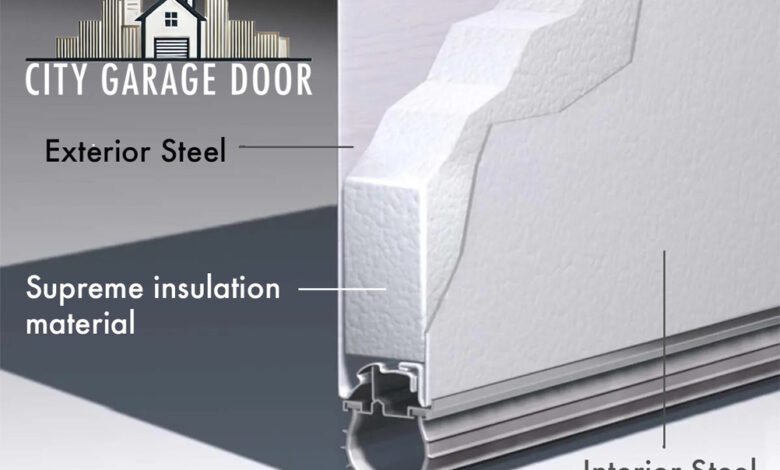Non-Insulated vs. Insulated Garage Doors: What to Choose

Most homeowners often recognize the benefits of insulating their walls, windows and doors for improved energy efficiency and comfort. However, a garage door may not be that important part of the house you would consider insulating, but it can lead to several long term benefits.
When it comes to energy efficiency, noise reduction, and durability, insulated garage doors often win hands down. So, should you install insulated garage doors right away?
Not necessarily. Maybe non-insulated garage doors work better for your situation.
To help you decide, let’s delve into the comparison of these doors, navigating the pros and cons of both options as well as when to choose the one.
A Brief Definition of Insulated Garage Doors
Insulated garage doors are exactly what they sound. They are made or retrofitted with insulation material. This insulation is generally placed within the door panels so that it can act as a thermal barrier between the outside temperature and the inside temperature.
Understanding the Benefits of Insulated Garage Doors
- The primary benefit of insulated garage doors is that they can regulate temperature, meaning that they keep the garage at a stable temperature.
- Since these doors help maintain even temperatures, they can help you save on energy costs.
- The insulation present in them helps dampen the sound, thereby reducing noise.
- The extra thickness of insulation makes these doors durable.
The Downsides of Insulated Garage Doors
While insulated doors come with several advantages, they have their fair share of disadvantages. Here are a few to know:
- Insulated garage doors are expensive.
- They are heavier than the non-insulated doors due to the layer of insulation, leading to complicating manual operation in case of a power outage.
- In some climates, they are prone to trap moisture. They can develop mold or rust if not taken care of.
When to Go for Non-Insulated Garage Doors?
- If you live in areas with extreme temperature
- If you are looking to use your garage as a gym, workspace, or pet house
- If you are bothered by outside noise
- If you want to save on energy cost
What are Non-Insulated Garage Doors?
A non-insulated garage door is a standard garage door. It lacks any added insulation materials within its construction. Typically, they are constructed from a single layer of materials, including steel, aluminum or wood.
What are the Advantages of Non-Insulated Garage Doors?
- They are cheaper than insulated doors.
- As they lack the insulation layer within them, they are likely to be lighter than insulated ones. It means they are less likely to bother your garage door opener.
- As they have a more straightforward construction, repairing and maintenance are quite easy.
What are the Disadvantages of Non-Insulated Garage Doors?
- The lack of insulation means these doors are not quite effective at preventing temperature changes.
- They don’t have much sound dampening.
- Since they lack the added insulation layer, they are more prone to dents and damage.
When to Go for Non-Insulated Garage Doors?
- If you live in a place with a mild temperature.
- If your garage is mostly used for parking vehicles.
- If your region has affordable energy costs.
- If you live in a serene environment like a rural area (as these doors don’t damp noise)
The Bottom Line:
Choosing between insulated and non-insulated garage doors is determined by your needs and priorities. While insulated doors can be chosen for their energy efficiency, noise reduction and durability, they come with higher upfront costs and added weight. Non-insulated doors can be a suitable investment for a garage located in an area with extreme temperatures.
You can reach out to your local garage door professional to choose the option that can work better for you. Best of luck!

